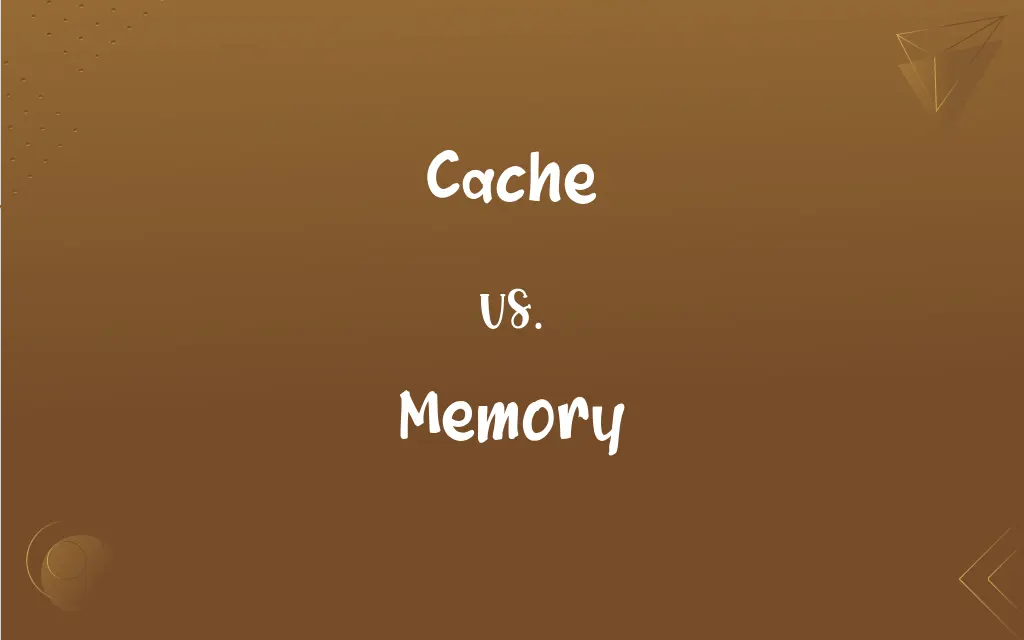Cache vs. Memory: What's the Difference?
Edited by Aimie Carlson || By Janet White || Published on February 10, 2024
Cache is a small, fast storage layer in a computer for temporarily holding frequently accessed data, while memory (RAM) is a larger, slower storage for currently used data.

Key Differences
Cache memory is a high-speed storage mechanism in the processor, providing quick access to frequently used data. Memory, or Random Access Memory (RAM), is a larger storage area in a computer that holds data currently being processed.
The cache is smaller but faster than RAM, designed to speed up data access for the processor. RAM is larger in capacity but slower, serving as the main memory for running applications and processes.
Cache is used to store copies of frequently accessed data to reduce latency. Memory, on the other hand, is used to store data that is actively being used or manipulated by the system.
The cache is closer to the CPU, enabling faster data retrieval. Memory, while still fast, has longer access times compared to cache.
Data in cache is temporary and gets overwritten frequently. Data in memory remains as long as it is needed for current processes and is lost when the system is powered off.
ADVERTISEMENT
Comparison Chart
Speed
Faster, designed for high-speed access
Slower than cache, but still fast
Size
Smaller in size, limited capacity
Larger in size, more capacity
Proximity to CPU
Very close to CPU for rapid access
Less close to CPU than cache
Purpose
To store frequently accessed data
To store data in active use
Data Persistence
Temporary, frequently overwritten
Retains data until power is off or changed
ADVERTISEMENT
Cache and Memory Definitions
Cache
An intermediate storage between the CPU and main memory.
The processor cache plays a crucial role in system performance.
Memory
The main data storage used by a computer to store running programs and data.
The computer's memory was upgraded to improve performance.
Cache
A small, fast memory unit in a computer for storing frequently accessed data.
The CPU cache improved the speed of data retrieval.
Memory
Random Access Memory (RAM), where data is stored for quick read and write access.
The system's memory handles multiple applications simultaneously.
Cache
A high-speed data storage mechanism in computing.
Cache memory helps in reducing the time to access data from main memory.
Memory
A volatile storage medium that loses its data when power is turned off.
When the computer shut down unexpectedly, data in memory was lost.
Cache
A component that stores data so future requests can be served faster.
The server's cache stored frequently requested web pages.
Memory
A component in computers for temporarily storing active data.
The application's performance depends on the amount of available memory.
Cache
A temporary storage area for quick access to data.
The web browser cache stores images for faster loading.
Memory
A key component in computing that affects speed and multitasking capabilities.
Upgrading the memory significantly boosted the laptop's multitasking ability.
Cache
An amount of goods or valuables, especially when kept in a concealed or hard-to-reach place
Maintained a cache of food in case of emergencies.
Memory
The mental faculty of retaining and recalling past experience.
FAQs
What does memory (RAM) do in a computer?
Memory, or RAM, is used for storing data that a computer needs to access quickly.
What happens when cache memory is full?
When full, old data in the cache is overwritten with new data.
How does memory affect a computer's performance?
More memory allows a computer to handle more tasks simultaneously, improving performance.
How does cache improve computing performance?
Cache reduces the time needed to access data from the main memory, speeding up processing.
What is cache in computing?
Cache is a small, fast memory unit that temporarily stores frequently accessed data.
Why is cache memory faster than RAM?
Cache memory is faster due to its proximity to the CPU and specialized design.
Can cache memory be upgraded?
Cache memory is typically fixed and integrated into the CPU.
Is memory the same as storage?
No, memory is temporary storage for active data, while storage refers to long-term data retention.
How is memory capacity measured?
Memory capacity is typically measured in gigabytes (GB) or terabytes (TB).
What affects memory speed?
Memory speed is influenced by its frequency and the type of RAM used.
Can increasing cache size improve performance?
Increasing cache size can improve performance, but it's typically not user-upgradable.
Are there different types of memory in a computer?
Yes, there are different types of memory, including RAM, ROM, and cache memory.
What types of cache are there in a computer?
There are typically three levels of cache in a computer: L1, L2, and L3.
How much memory do typical applications require?
Application memory requirements vary widely based on the complexity and design of the software.
What is the main role of memory in a computer?
The main role of memory is to store data and programs that are currently in use.
How do I clear my computer's cache?
Clearing cache typically involves using system tools or options within specific applications.
Do all computers have cache memory?
Yes, all modern processors have some form of cache memory.
Is cache memory volatile or non-volatile?
Cache memory is volatile, meaning it loses its data when power is turned off.
Can too much memory slow down a computer?
Generally, more memory improves performance, but other factors like CPU and disk speed also play roles.
What is the difference between cache and virtual memory?
Cache is physical memory for quick access, while virtual memory extends RAM onto the hard drive.
About Author
Written by
Janet WhiteJanet White has been an esteemed writer and blogger for Difference Wiki. Holding a Master's degree in Science and Medical Journalism from the prestigious Boston University, she has consistently demonstrated her expertise and passion for her field. When she's not immersed in her work, Janet relishes her time exercising, delving into a good book, and cherishing moments with friends and family.
Edited by
Aimie CarlsonAimie Carlson, holding a master's degree in English literature, is a fervent English language enthusiast. She lends her writing talents to Difference Wiki, a prominent website that specializes in comparisons, offering readers insightful analyses that both captivate and inform.







































































